NEWYou can now listen to Fox News articles!
On Sunday, commenting on the downfall of the Bashar al-Assad regime in Syria, President-elect Donald Trump took a dig at Russian President Vladimir Putin, a staunch supporter of Assad whom Putin gave political asylum in Russia.
“There was no reason for Russia to be there in the first place,” Trump wrote on Truth Social. Trump pointed to the fact that “600,000 Russian soldiers lay wounded or dead, in a war that should never have started, and could go on forever.” Trump said Russia is in a “weakened state right now,” because of “Ukraine and a bad economy.”
This swipe at Putin is likely to be a prelude to Trump’s Russia policy during his second term. If you thought Trump and Putin were buddies, don’t be fooled. There almost certainly will be no rapprochement between Moscow and Washington on Trump’s watch. Here’s why.
TRUMP’S PLAYBOOK: HOW PUTIN OUTSMARTED 4 US PRESIDENTS, THEN WAS OUTPLAYED BY ‘THE DONALD’
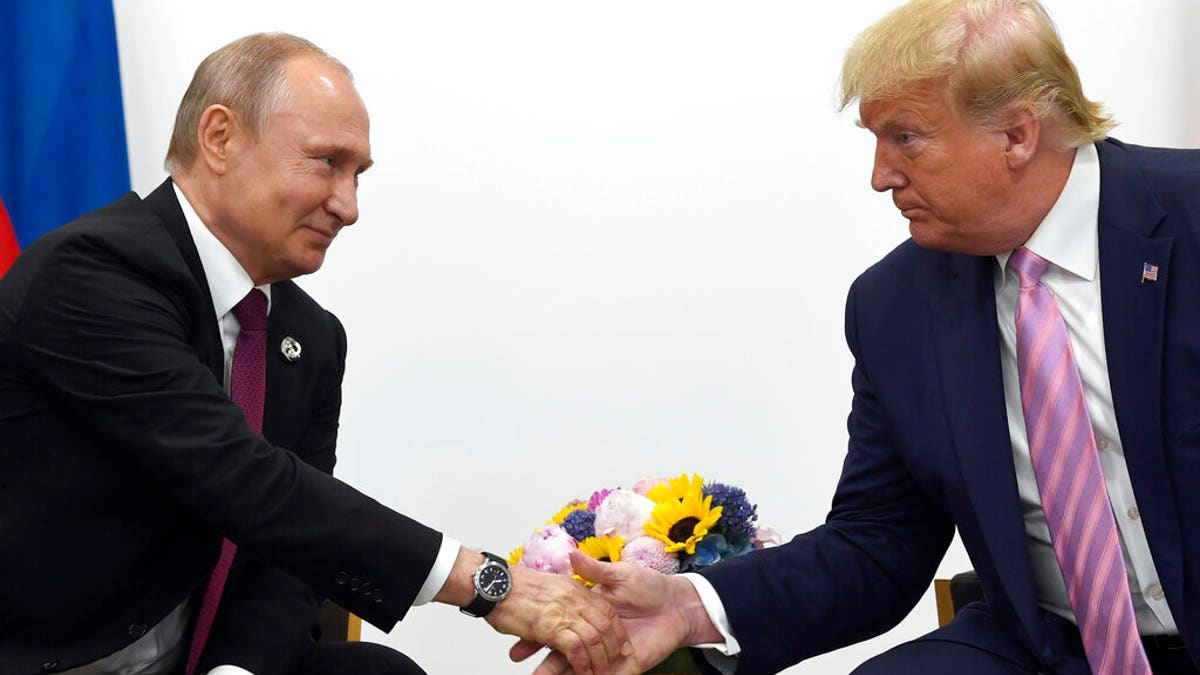
Then-President Trump, right, shakes hands with Russian President Vladimir Putin during a bilateral meeting on the sidelines of the G-20 on June 28, 2019. (AP Photo/Susan Walsh, File)
Whether President-elect Trump succeeds in settling the almost three-year-old devastating conflict between Russia and Ukraine, as promised, his negotiating talents, not withstanding, the incoming commander in chief is highly unlikely to erase the fundamental irreconcilable differences between Moscow and Washington. Ukraine, where Russia and the United States are currently head locked in a proxy war, is just one example of Russia’s national interests colliding directly with U.S. long-term bi-partisan foreign policy.
Moscow and Washington each want Ukraine within their sphere of influence. Russia considers Ukraine as part of its strategic security perimeter and, therefore, off limits to U.S. geopolitical control. To enforce Russia’s version of the Monroe Doctrine, Putin has been waging a brutal war on Ukraine. His goal is to keep Ukraine out of NATO, an adversarial military alliance, in Moscow’s view. Similarly, Russia considers other former Soviet states, such as Georgia and Moldova, as part of its vital interests.
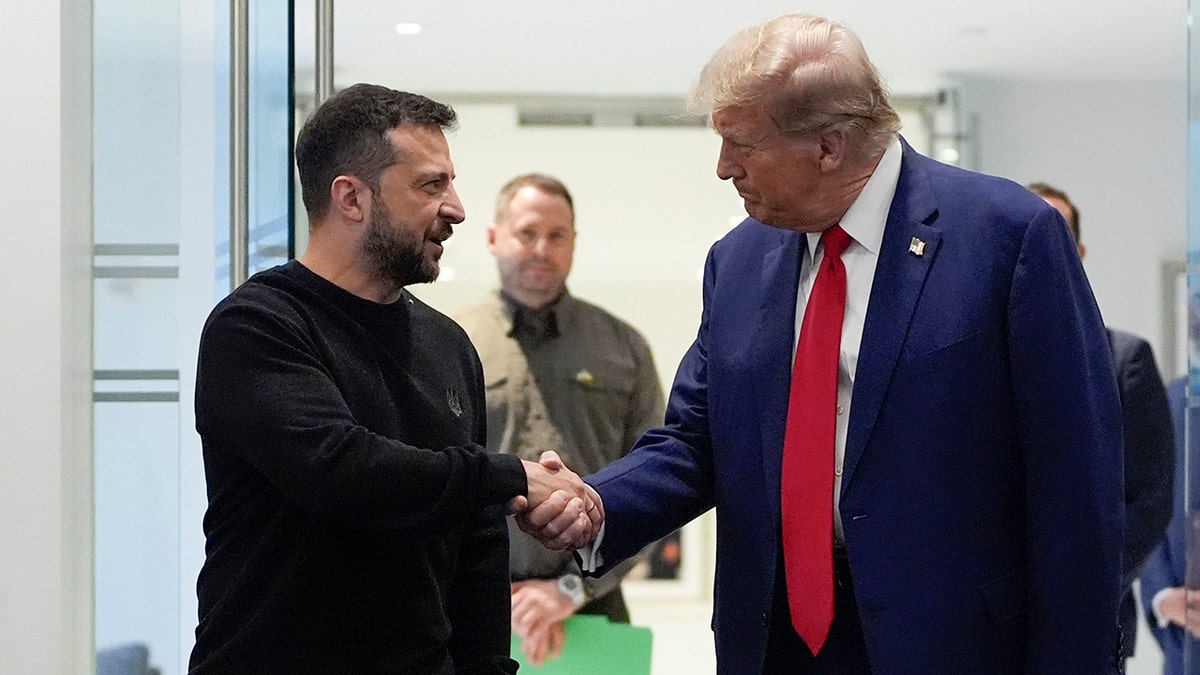
Former President Donald Trump, right, meets with Ukrainian President Volodymyr Zelenskyy at Trump Tower on Friday, Sept. 27, 2024 in New York City. (AP Photo/Julia Demaree Nikhinson)
The U.S. policy in Eurasia is almost a century old and is highly unlikely to change in the foreseeable future. This policy has been guided by the so-called “defend forward” logic, conceptualized by the Dutch American geostrategist John Spykman in the 1930s. A balance-of-power realist, Spykman convinced the U.S. national security establishment that to improve its chances of survival, America should get involved in Eurasian affairs. This strategy called for the creation of U.S. strategic alliances and military bases in Eurasia, in order to prevent an emerging rival power that could threaten America.
Spykman’s doctrine was rooted in the British geographer Halford Mackinder’s thesis, put forth in 1904, that whoever controls Eurasia—which he called the World Island—commands the world. Mackinder believed that Eurasia is predetermined to play a dominant role in global politics because of its vast natural resources and central location on the globe.
5 REASONS WHY ZELENSKYY’S VICTORY PLAN FOR UKRAINE IS A NO-WIN GAMBLE
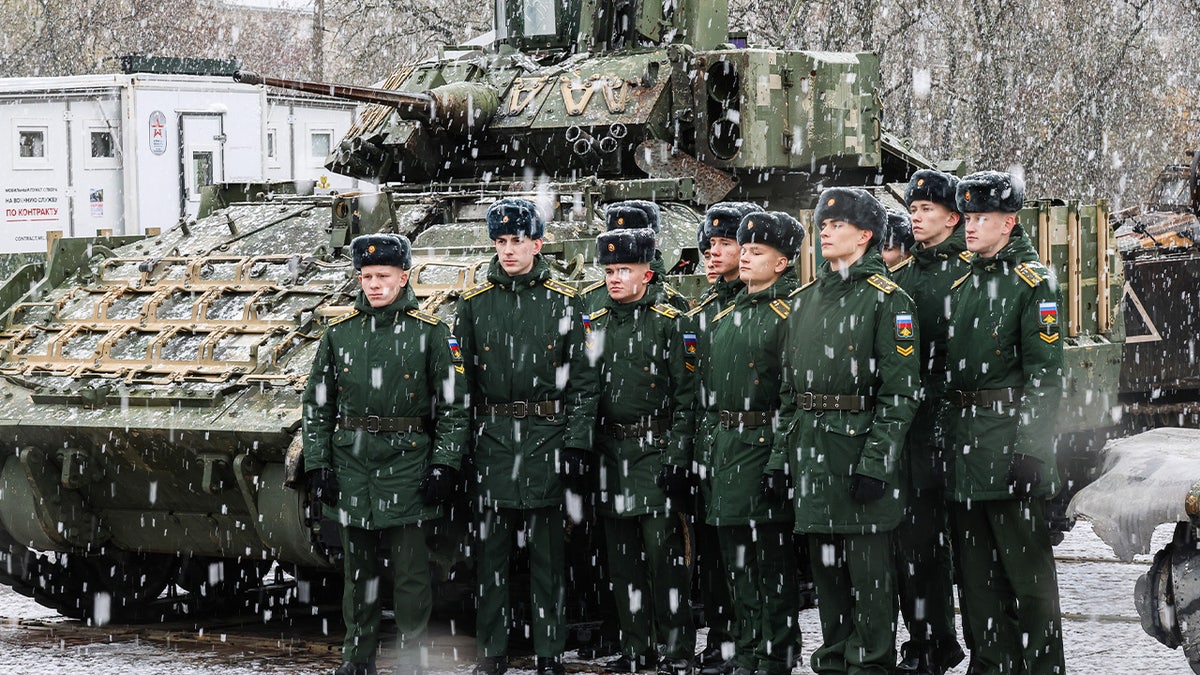
Russian servicemen take a group photo near a U.S. M2 Bradley fighting vehicle captured in Ukraine by Russian troops, in St. Petersburg, Russia, on Nov. 3, 2024. (Photo by Artem Priakhin/SOPA Images/LightRocket via Getty Images)
Former President Jimmy Carter’s national security advisor Zbigniew Brzezinski summarized this policy in his 1997 book, “The Grand Chess Board: American Primacy and Its Geostrategic Imperatives.” Echoing Mackinder and Spykman, Brzezinski wrote that the U.S. must “make certain that no state…gains the capacity to expel the United States from Eurasia or even to diminish significantly its decisive arbitrating role.”
The Russians took Brzezinski’s strategic guidance -“who controls Eurasia controls the world” – seriously. They concluded that what Washington was after was Russia’s containment and territorial fragmentation. A major Russian think tank summed up its perception of U.S.-Russia policy as follows. “The United States will strive to weaken and dismember the rest of the world, and first of all the big Eurasia. This strategy is pursued by the White House regardless of whether it is occupied by the conservative or liberal administration or whether or not there is consensus among the elites.”
The deeply seeded distrust between Russia and the U.S. dates back to Soviet times. Trump is highly unlikely to overcome it. At the center of this distrust is the expansion of NATO.
Moscow and Washington have entirely different interpretations of what was promised to Russia when U.S. Secretary of State James Baker met with Soviet leader Mikhail Gorbachev on Feb. 9, 1990, as part of the negotiations on the peaceful re-unification of Germany. The Russians took Baker’s famous assurance “not one inch eastward” as a promise not to admit former Soviet states into the Alliance, a claim that U.S. and NATO leaders deny, some calling it a “myth.”
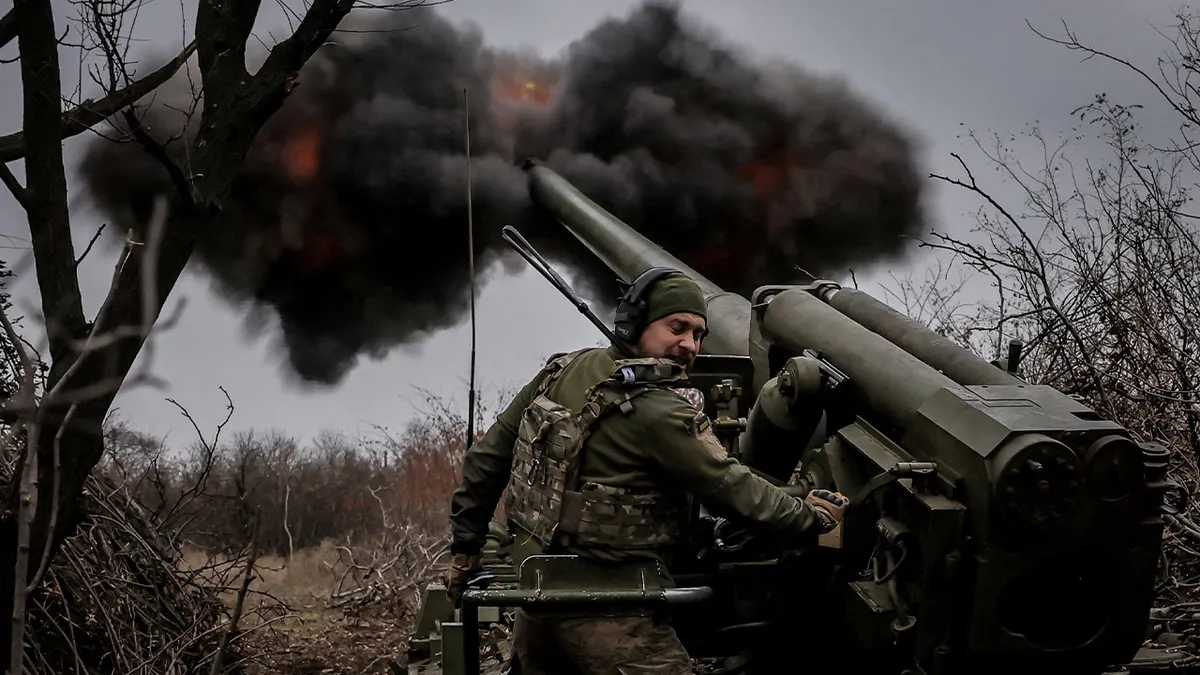
A serviceman from the 24th Mechanized Brigade, named after King Danylo of the Ukrainian armed forces, fires a 2s5 “Hyacinth-s” self-propelled howitzer toward Russian troops at a front line amid Russia’s attack on Ukraine, near the town of Chasiv Yar in Donetsk region of Ukraine on Nov. 18, 2024. (Oleg Petrasiuk/Press Service of the 24th King Danylo Separate Mechanized Brigade of the Ukrainian Armed Forces/Handout via REUTERS )
Following the collapse of the USSR in 1991, NATO admitted the Baltic States — Estonia, Latvia, Lithuania — which used to be part of the USSR and added several former Soviet bloc countries, such as the Czech Republic, Hungary and Poland, to the alliance. In total, 13 Eastern European states have become NATO members since 1997. This resulted in the reduction of Russia’s buffer zone from 1,000 miles during Soviet times to 100 miles. Feeling duped, Moscow accused the U.S. and NATO of violating their promises. Putin made it his life-long mission to restore the lost buffer against NATO.
Thirty declassified U.S., Soviet, German, British and French documents, consisting of written contemporaneous memcons and telcons at the highest levels, reveal that Gorbachev indeed received what he perceived as NATO’s promises not to erode Russia’s security. For example, the U.S. Embassy in Bonn informed Washington that German Foreign Minister Hans-Dietrich Genscher made clear “that the changes in Eastern Europe and the German unification process” would not lead to an “impairment of Soviet security interests.”
CLICK HERE TO GET THE OPINION NEWSLETTER
The same cable included language indicating that NATO should rule out an “expansion of its territory towards the East, i.e. moving it closer to the Soviet borders.” However, the phrase “led to believe” appears to be the key verbiage used across these documents, which contributed to the difference of interpretations. The phrase reflects the informal nature of assurances rather than legal guarantees.
That is why Putin will almost certainly not accept, as part of the peace settlement Trump seeks to broker between Russia and Ukraine, anything less than formal legal guarantees from NATO, precluding Ukraine’s membership.
Putin does not trust Trump, despite the seemingly positive rapport between the two. Nor does Trump trust Putin. During his first term, Trump took several actions that aimed at undermining Russia’s military strategy and economy. Trump sanctioned the Nord Stream 2 pipeline, founded the U.S. Space Force, ordered the development of a low-yield, nuclear-armed, sea-launched cruise missile and authorized an operation that killed 300 of Russia’s Wagner Group mercenaries in Syria. In 2017, Putin summed up his realpolitik relationship with Trump. He “is not my bride. And I am not his bride, nor his groom. We are running our governments,” Putin told a reporter at an economic summit.
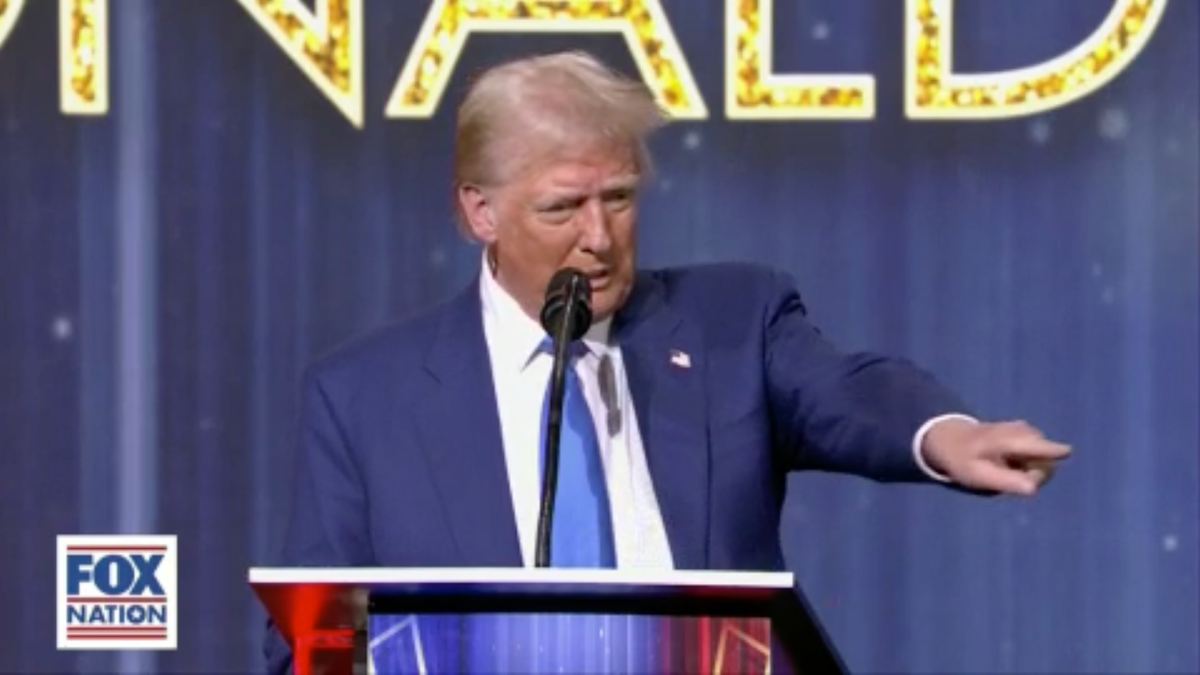
President-elect Donald Trump accepts the ‘Patriot of the Year’ award at Fox Nation’s Patriot Awards. (Fox Nation)
President Biden’s recent drastic policy change, green-lighting Ukraine to attack Russia properly with U.S.-supplied long-range missiles, served as confirmation for Putin that Washington cannot be trusted. It’s why, in response to Trump’s recent request to Putin, that reportedly took place during a phone conversation, not to escalate in Ukraine, Putin did the opposite. The Russian made two highly escalatory moves. Putin approved changes to Russia’s nuclear doctrine, lowering the threshold for nuclear weapons’ use, and he authorized a strike on Ukraine with a new class of experimental hypersonic missile, the Oreshnik. The Oreshnik has sufficient range to target all of Europe and the U.S. West Coast. Neither the U.S. nor NATO have any defenses against it.
CLICK HERE TO GET THE FOX NEWS APP
A product of the Russian strategic culture, Putin has a worst-case scenario mindset. Presupposition of inevitable conflict, deeply rooted in the Russian thinking will always drive Moscow’s foreign policies. A talented businessman, Trump may be able to transition U.S.-Russia relations from hostile onto a transactional basis. But Trump or not, Russia and America will never become friends.
CLICK HERE TO READ MORE FROM REBEKAH KOFFLER
